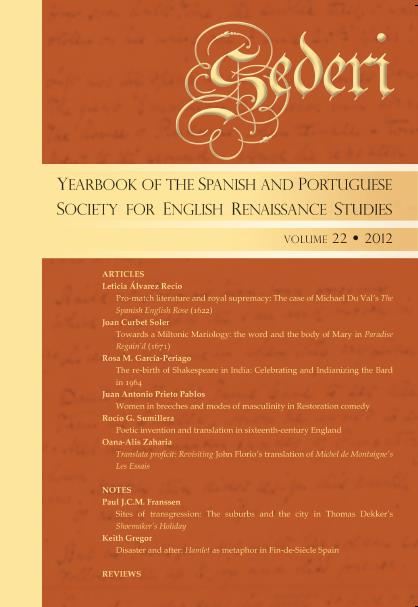Poetic invention and translation in sixteenth-century England
Palabras clave:
Invention, Renaissance English and French poetics, Renaissance translation, imitationResumen
This article investigates the connection between the all-important concept of invention within the literary terminology of sixteenth-century England and the perception of translation during this period. Invention is discussed as a concept in transition during the sixteenth century, as it was then still associated with the rhetorical notion of “finding” within a topical system, while new shades of meaning closer to imagination, fantasy, fancy and wit started to become dominant even in rhetorical contexts. Invention was deemed in the sixteenth century a necessary ingredient for outstanding poetry, and yet it was assumed to be absent from the work of the translator, whose role was solely to copy the invention of the source text. This article claims that the lack of invention in translations (or rather, the mere following of the invention of the translated text) was the main reason why translations were invariably regarded as minor achievements as compared to their source texts.
Descargas
Descargas
Publicado
Número
Sección
Licencia
The copyright holder of the published contributions is SEDERI.The hardcopy and an open-access version of the journal will be published simultaneously. The issues will be available online in the SEDERI website (http://www.sederi.org/yearbook/) and other repositories that have signed an agreement with SEDERI.
The authors who publish with this journal agree to the following terms:
a) SEDERI retains copyright of the essay.
b) If the author wishes to republish or rewrite the essay for another journal, or include the essay published in SEDERI in their personal repositories, or in any other way, they should contact the editors to obtain permission to do so. This will entail citing SEDERI as the original source and sending the editors a copy of the new version, or the link to the website, in case of online publishing.
The author(s) hereby warrant(s) that:
a) The essay submitted for publication is an original creation and does not infringe any copyright or property right of another journal, author or publisher.
b) The essay submitted for publication has not been previously published, whole or in part, and is not being considered for publication elsewhere.
c) Written permission has been obtained for any material from other sources included in the essay submitted for publication.




